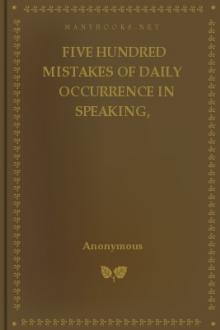Five Hundred Mistakes of Daily Occurrence in Speaking, Pronouncing, and Writing the English Language, Corrected
Book Excerpt
"He drinks wine at dinner," means that such is his habit; "he is drinking wine at dinner," refers to one particular time and occasion.
Adverbs are often inelegantly used instead of adjectives; as, "the then ministry," for "the ministry of that time."
Of the phrases "never so good," or, "ever so good," as to whether one is preferable to the other, authority is divided. Modern usage inclines to the latter, while ancient preferred the former, as in the Scriptural expression, "charm he never so wisely."
Yea and nay are not equivalent to yes and no; the latter are directly affirmative and negative, while the former are variously employed.
Of prepositions, it has been frequently said, that no words in the language are so liable to be incorrectly used. For example, "The love of God," may mean either "His love to us," or, "our love to Him."
Editor's choice
(view all)Popular books in Language, Reference, Fiction and Literature
Readers reviews
- Upvote (0)
- Downvote (0)

 Free Download
Free Download






















